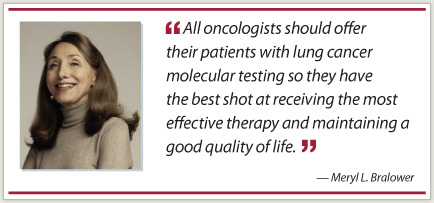When intermittent chest pains sent me to the emergency room nearly a decade ago, I worried that I was having some kind of cardiac event. The ER doctor wanted to make sure that I didn’t have a pulmonary embolism, so in addition to ordering a complete cardiac workup, she also ordered a chest x-ray to make sure my lungs were clear. When the test came back showing a shadow on my left lung, she wasn’t concerned because, she said, “You’ve never smoked.”
 Still, she recommended that I get a CT scan, which showed that my left lung was clear but that I had a lesion on my right lung. Even then I wasn’t too concerned. Because the lesion was in a difficult place to biopsy and cancer seemed such a remote possibility, my surgeon suggested watchful waiting. But when the tumor started growing, I immediately had a lobectomy. The pathology test of the tumor found stage II adenocarcinoma.
Still, she recommended that I get a CT scan, which showed that my left lung was clear but that I had a lesion on my right lung. Even then I wasn’t too concerned. Because the lesion was in a difficult place to biopsy and cancer seemed such a remote possibility, my surgeon suggested watchful waiting. But when the tumor started growing, I immediately had a lobectomy. The pathology test of the tumor found stage II adenocarcinoma.
The diagnosis was shocking. I’ve always led a healthy lifestyle. I’m careful about what I eat, I exercise regularly, and I’ve never smoked a cigarette. My diagnosis came just before the death of Dana Reeve, also a never-smoker, who died of lung cancer in 2006. Reeve’s fame and high-profile death helped catapult the message to the general public that lung cancer isn’t just a disease of smokers and that people shouldn’t be complacent about their chances of getting lung cancer just because they don’t smoke or have quit smoking. In fact, research from the Lung Cancer Research Foundation found that 15% of lung cancer cases occur in people who have never smoked.
Importance of Molecular Testing
A psychotherapist and management consultant by profession, I now dedicate my life to patient advocacy. Soon after my surgery and an adjuvant chemotherapy regimen of cisplatin and gemcitabine, my oncologist asked if he could do a genetic test on my tumor to see if I had the epidermal growth factor receptor (EGFR) gene mutation, which was the only molecular test available in 2005. I didn’t have the EGFR mutation, but 2 years ago I was tested again and was positive for the anaplastic lymphoma kinase (ALK) gene mutation.
Hopefully, my lung cancer will never recur, but if it does, I’ll have the benefit of targeted therapy based on my molecular profile. And that’s the message I give to every person with lung cancer I encounter through my patient advocacy work and fund-raising efforts for lung cancer research, as well as in the articles I write. Indeed, all oncologists should offer their patients with lung cancer molecular testing so they have the best shot at receiving the most effective therapy and maintaining a good quality of life.
Given my experience over the past decade, I have two mantras that I repeat to everyone I meet: (1) You don’t have to be a smoker to get lung cancer; and (2) If you’ve been diagnosed with cancer, get your tumor genetically profiled. ■
Meryl L. Bralower lives in Boston, Massachusetts, and is on the board of Uniting Against Lung Cancer, a nonprofit lung cancer research foundation.

